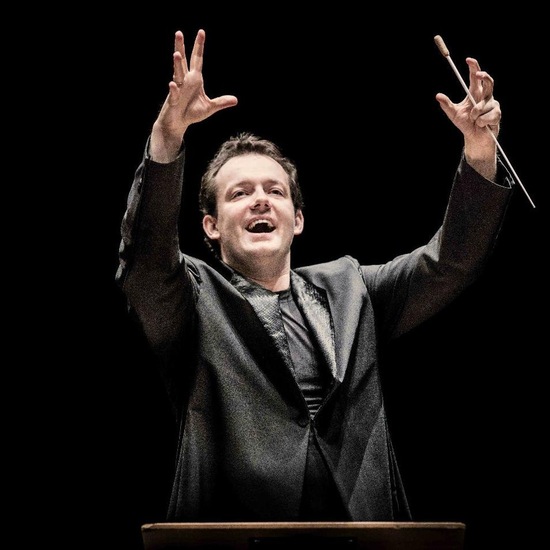Nelsons, BSO reach the summit with Strauss’s “Alpine Symphony”

Andris Nelsons led the Boston Symphony Orchestra in Richard Strauss’s “Alpine Symphony” Thursday night at Symphony Hall.
When Richard Strauss was a boy, he had an experience he would never forget. With a group, he climbed the Alps and took in its arresting beauty, its rolling brooks and its pristine fields. The travelers were even caught up in a storm, but they made it down safely, all the happier for the experience.
In 1911, the composer, by then well known for his tone poems and operas, recalled his boyhood memories and crafted a musical work out of them. An Alpine Symphony was the result, a vivid musical journey into the majesty of unspoiled nature.
The grand images of mountains and forests lingered in the memory Thursday night at Symphony Hall, where the Boston Symphony Orchestra, led by Andris Nelsons, offered a rare performance of the piece.
An Alpine Symphony is actually more of a tone poem that is cast in twenty-two sections and runs about 50 minutes. As is usual in Strauss’s symphonic works, the piece calls for a gargantuan orchestra, and for that reason, it isn’t often heard in concerts.
Indeed, performances by the BSO have been few and far between, with the last subscription performance heard in January 2008. For Nelsons, though, it’s a popular repertoire item. He led the Tanglewood Music Center Orchestra in the piece at Tanglewood this past summer and has previously recorded it with the City of Birmingham Symphony Orchestra.
The music of Strauss is a specialty for the Latvian conductor, and recent seasons have brought exciting renditions of Salome, Elektra, and Der Rosenkavalier to Symphony Hall. The Alpine Symphony, with its mix of Wagnerian leitmotifs and Mahlerian grandeur, are a perfect fit for his technicolor approach.
Details were aplenty. The strings and brasses in the opening night scene conjured primordial depths. “Sunrise” was bold and brilliant, with trumpets and horns pealing out radiant phrases over the orchestra. Cowbells and woodwind calls captured pastoral warmth in the “Flowery Meadow,” and the “Thunderstorm” erupted with power and urgency.
But Nelsons also led with an eye to the big picture. Phrases were sculpted with tasteful rubato shading. Crescendos seemed to grow from the bottom up, resulting in bright climaxes when the traveler reached the summit.
Strauss’s tone painting reveals the sublimity of nature, and Nelsons and the BSO’s musical journey, which will be recorded for a later CD release, was indeed time well spent.
The concert opened with a short curtain raiser by Derek Bermel. Elixir, written in 2006, is a work of searching mystery. Its structure is deceptively simple, but the piece’s Ivesian cross rhythms and collage-like texture make it difficult to play. A soft phrase, harmonized by a repetitive chord progression, runs through the eight-minute piece and takes on shimmering dissonances along the way. Wind calls interrupt the melody midway through, and the orchestra dissolves into a cloud of harsh sounds.
It makes for interesting listening, and this is clearly a work that the BSO believes in. The orchestra delivered both a sensitive and robust performance to make a strong case for Bermel’s piece.
The solo spotlight of the evening fell upon Leonidas Kavakos, who offered Prokofiev’s Violin Concerto No. 2.
Though it doesn’t blaze with the intensity of his First Violin Concerto, Prokofiev’s Second courses with bristly sonorities while keeping an eye to romantic idioms. Long, lyrical lines run through this piece like thread.
And in those sections, Kavakos was at his best. With a tone of light silver and a touch of grain, he rendered the opening folk theme with glowing distance. For the sunlit second theme, his tone beamed with resonant warmth. In the second movement, Kavakos spun a gentle, Bachian line over sparse accompaniment.
Missing from the first movement, at least, was a sense of driving energy. The bold chords that follow the opening theme came off as rather staid, and though the propulsive sections were played with dexterous technique, Kavakos didn’t dig in. The work’s Bartókian frenzy, as a result, went missing.
But Kavakos turned on the heat in the finale, tossing off the sharp chords and thorny passages with strength. The work’s “Spanish” inflections, featuring castanets, had a touch of the sarcasm so integral to the composer’s works. Nelsons followed Kavakos’ lead and coaxed an accompaniment well attuned to the concerto’s soft lyricism.
The program will be repeated 1:30 p.m. Friday and 8 p.m. Saturday at Symphony Hall. bso.org; 888-266-1200
Posted in Performances





Posted Dec 03, 2017 at 6:32 am by jacob cohen
And the encore? Exquisite Saturday night. By the way, what was it?
Posted Dec 06, 2017 at 10:16 am by Aaron
He didn’t play an encore last Thursday night, but the BSO press office has stated that on Saturday Kavakos played the Andante from Bach’s Sonata No. 2 in A minor.